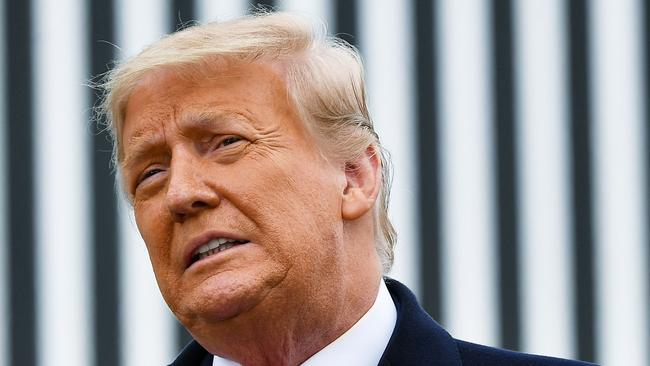Donald Trump’s legal woe doesn’t end here
There is little chance Donald Trump will be convicted by the US Senate of inciting an insurgency but his legal troubles won’t end with the conclusion of his second impeachment trial.

There is little chance Donald Trump will be convicted by the US Senate of inciting an insurgency but his legal troubles won’t end with the conclusion of his second impeachment trial starting on Wednesday AEDT.
The former president could soon be indicted on criminal charges, not to mention the multiple civil actions that have been filed against him.
The former New York property tycoon, now ensconced in his luxurious Florida residence, is no stranger to the legal system, with his army of lawyers long accustomed to defending him and attacking his opponents during civil hearings.
Now that Mr Trump is again a mere citizen without the protection of presidential immunity, he risks the unprecedented infamy of being indicted.
He is the target of at least one criminal investigation, led by Manhattan prosecutor Cyrus Vance, who has been fighting for months to obtain eight years of Mr Trump’s tax returns.
Initially focused on payments before the 2016 presidential election to two women who claim they had affairs with Mr Trump, the state-level probe is also examining possible allegations of tax evasion, and insurance and bank fraud.
In July, the Supreme Court ordered the former president’s accountants to hand over the financial documents to Mr Vance’s team, but lawyers have challenged the scope of the requested documents and a ruling is pending.
Mr Vance’s case, heard behind closed doors before a grand jury, appears to be moving along, though. According to US media, investigators from Mr Vance’s office recently interviewed employees of Deutsche Bank, which has long backed the former president and the Trump Organisation. They also spoke to staff at Mr Trump’s insurance broker Aon.
The investigators have also interviewed Mr Trump’s former personal lawyer Michael Cohen, who received a three-year prison term after admitting making hush payments to the two alleged mistresses of Mr Trump.
The ex-lawyer had testified to congress that Mr Trump and his company artificially inflated and devalued the worth of their assets to both obtain bank loans and reduce their taxes.
New York Attorney-General Letitia James is also investigating the allegations. Her team interviewed one of Mr Trump’s sons, Eric, under oath despite the opposition of Trump lawyers, and obtained documents on some of the family’s properties.
Her investigation is a civil one, but she said recently that if she finds any evidence of criminal activity it will “change the posture of our case’’.
If Mr Trump is ever convicted he would be at risk of imprisonment. Unlike federal offences, state convictions cannot be pardoned by the president.
However, prosecutors, aware of the volatility of the American political climate, may think twice before pursuing him, several lawyers say.
“I don’t think anyone is going to be jumping at it,” said Daniel Richman, a former prosecutor and law professor at Columbia University.
“The last thing you want is for the process to be used as or perceived as being used as just another tool in a political operation.”
Roberta Kaplan, a lawyer who is leading three civil actions against Mr Trump, says there are two schools of thought. “I’m very much of the school that you don’t refrain from doing justice out of a fear that if you do justice, it will inflame people,” she said.
Ms Kaplan believes that pursuing charges against Mr Trump would uphold the principle that no one in the US is above the law.
For Gloria Browne-Marshall, a law professor at The City University of New York, envisions what she describes as the “Al Capone scenario’’ where the legendary 1920s gangster was convicted of tax evasion, not other more serious crimes he committed.
But even if an indictment is likely before Mr Vance’s term is up in October, Professor Browne-Marshall has difficulty foreseeing a trial or sentence.
With millions of Trump supporters ready to fund his defence, he could counterattack with his own legal actions and drag the cases out for years, she said.
Prosecutors, who are elected and dependent on taxpayers’ money, would have to mobilise a considerable war chest to indict him — something they may not be willing to do.
AFP



To join the conversation, please log in. Don't have an account? Register
Join the conversation, you are commenting as Logout